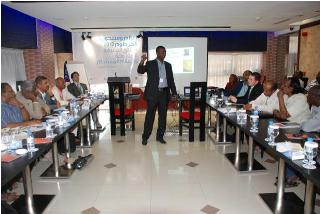Sudan media urged to embrace digital revolution
May 5, 2013 (KHARTOUM) – Restrictions on press freedoms shouldn’t preclude the development of other media in Sudan, a forum in Khartoum on journalism’s digital revolution heard on Saturday.

It also examined different ways that Sudanese media could capitalise on the emergence of new technologies and social networks.
The Media and Makers: Khartoum 2013 forum was attended by about 100 leading Sudanese journalists, bloggers, editors and publishers.
Speaking during a discussion session, Sudanese publishers maintained that print media in Sudan is bucking the trend of worldwide decline, saying that as a developing country with limited access to new technologies, the medium still faced a long-term future.
However, founder of Khartoum-based lifestyle magazine In the City Mostafa Khoghali rejected this, saying Sudan’s youthful population was embracing social media and new technologies at increasingly high rates.
He also disputed claims from publishers that economic disparities in Sudan restricted access to technology, telling participants that even tea ladies and rickshaw drivers are accessing Facebook and mobile internet.
He said despite Sudan’s restrictive press environment, there were still niche opportunities in the market for media diversification in fields such as tourism, entertainment and lifestyle.
Recent statistics show that close to one-fifth of Sudan’s population has access to the internet, putting it at number 11 of Africa’s top internet users. The figures showed that Facebook, Google and YouTube are among the most visited websites in Sudan, with online forums, E-newspapers and online versions of some of the county’s best-selling print dailies also in the top 20.
MICT’s Roman Deckert said while the digital age presented a fresh set of challenges for media entrepreneurs and journalists in Sudan, it also offered opportunities for them to improve their livelihoods.
“This is coming sooner or later and I think journalists in Sudan need to be proactive about facing this challenge, but at the same time take advantage of all that it offers”, he told Sudan Tribune.
Participants at the Khartoum forum heard from experts in their field on how innovative business models can generate alternative revenues for publishing companies, ways journalists can diversify their incomes, how new technologies can enhance the quality of Sudanese journalism and methodologies to improve access to information.
MICT specialises in media capacity building in crisis regions and has been running journalism training projects and cultural programs in Sudan and South Sudan since 2008.
The Khartoum event, which concluded on Sunday, followed last December’s forum in Juba on the same topic.
REPRESSIVE ENVIRONMENT
Journalism in Sudan continues to operate in an increasingly repressive and challenging environment, with those that dare to challenge authorities on sensitive issues suffering censure, harassment or even closure.
While newsstands in the Sudanese capital provide an impressive selection of some 30 newspaper titles, covering politics, sports and lifestyle, MICT says their reach is almost entirely limited to the greater Khartoum area and a few urban centres, with logistical and economic restraints preventing more widespread distribution.
Advertising levels are also low, largely limited to a few powerful telecommunications companies and banks.
Journalists in Sudan remain subject to strict censorship and government controls, with media content heavily scrutinised by the National Intelligence and Security Services (NISS) prior to publication on broadcast.
“There is a red line. You can’t report about Darfur. You can’t report on politics or anything about [Sudanese president Omer Hassan] al-Bashir. You can’t report about the ICC [International Criminal Court] or genocide”, one Khartoum-based journalist told Sudan Tribune.
In efforts to circumvent tight censorship controls, he said journalists often post articles on sensitive issues rejected for publication in the national press on popular online forums such as Al-rakoba and Sudanese Online, widely read by the Sudanese diaspora.
In a statement issued on World Press Freedom Day on 3 May, Human Rights Watch (HRW) said Sudanese authorities had stepped up censorship of print media in recent weeks, blocking the website of a popular online newspaper and forum.
NISS officials use a variety tactics to exercise censorship, ranging from phone calls to publications to direct their coverage to confiscating entire editions or shutting down newspapers.
Last month, the NISS re-imposed direct pre-printing censorship on a number of independent dailies, including al-Ayyam, al-Sahafa, al-Khartoum, and al-Youm al-Tali.
“Sudan muffles critical speech through a long menu of direct and indirect tactics, violating the basic freedoms enshrined in the constitution,” said Daniel Bekele, HRW’s Africa director.
“The security agency officials’ intimidation and threats of the news media are clearly designed to ensure that the Sudanese people are kept in the dark about sensitive topics that are of huge public interest”, he added.
HRW says tight censorship controls on the Sudanese press underscores the need for urgent reform of national security laws in line with international standards.
(ST)
